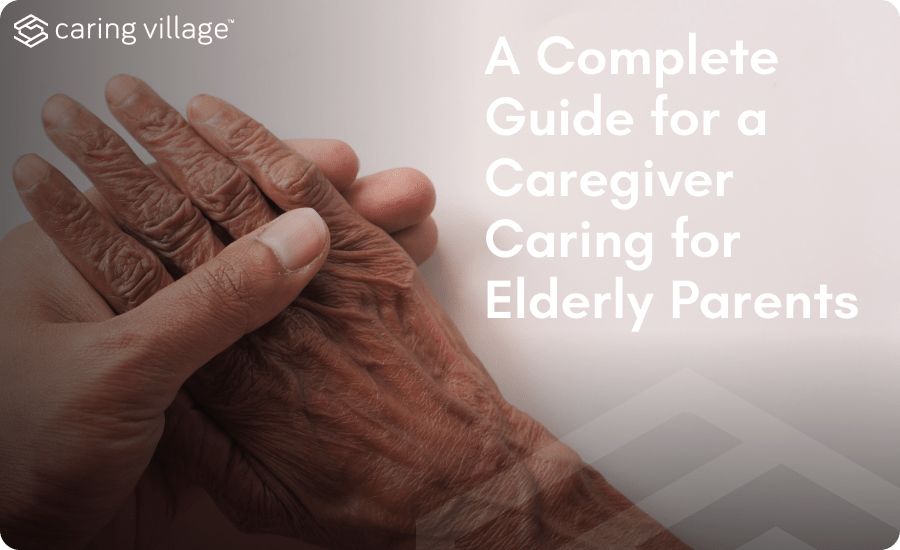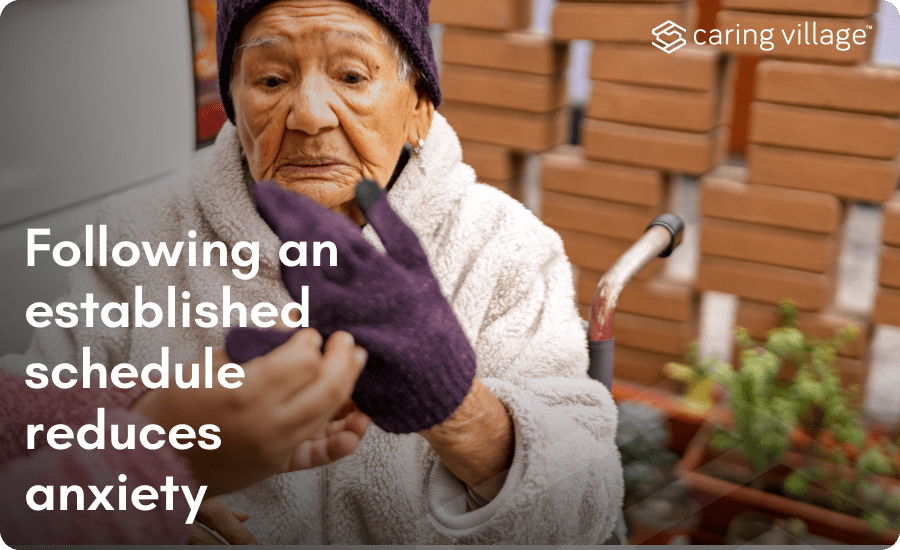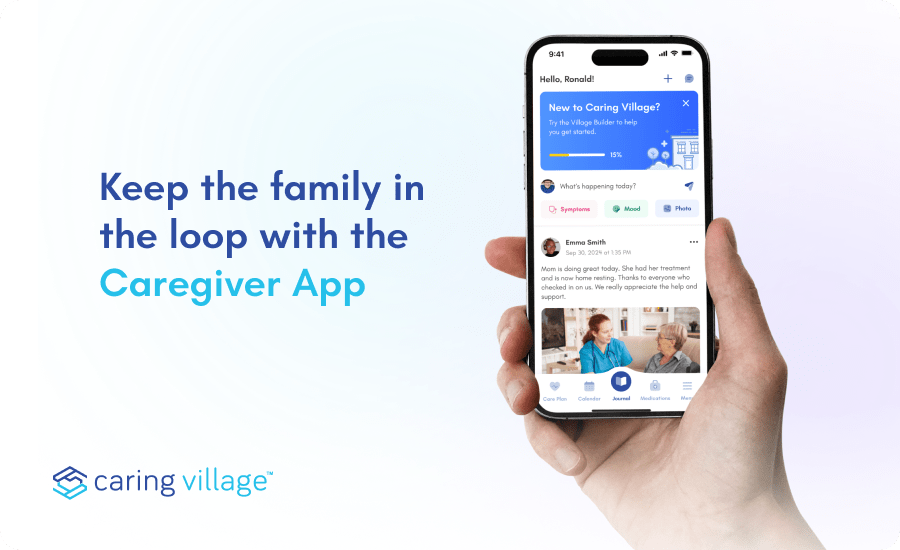
Key Takeaways:
- Caregivers spend an average of 27 hours per week providing care, and 24% provide 40 or more hours a week
- Taking care of elderly parents requires planning for medical, emotional, and daily living needs while protecting independence and dignity
- Long-distance caregiving is increasingly common and can be managed effectively through communication, coordination, and digital tools
- Building a reliable local support network, including neighbors, professionals, and community agencies, reduces stress and strengthens safety
- Understanding legal and financial considerations early, such as power of attorney and benefits eligibility, prevents future complications
- Prioritizing self-care and arranging respite care are essential to sustain physical and emotional health over time
- Apps like Caring Village’s Caregiver App help families coordinate tasks, store health information, and communicate securely in one place
According to the National Alliance for Caregiving’s 2025 Caregiving in the U.S. report, caregivers spend an average of 27 hours per week providing care, and 24% provide 40 or more hours a week. Many of these caregivers are adult children supporting their elderly parents with meals, medications, and companionship. Their commitment helps millions of older adults remain safe and comfortable in their own homes.
What starts as a quick favor, like picking up prescriptions or calling to check in, can quietly evolve into full-time caregiving. Over time, you might find yourself juggling medications, doctor visits, and emotional support, all in a single day. Understanding what caregiving involves and how to balance its challenges helps families make confident, compassionate decisions.
Here’s what you’ll learn in this article:
- What it means to be a caregiver and the roles it includes
- Key considerations when taking care of elderly parents, from health needs to daily living
- How to approach long-distance caregiving with communication and planning
- Ways to build a local support network that shares the workload
- Legal and financial steps that protect you and your parents
- Practical self-care and well-being strategies for sustained support
Manage tasks, share updates, and stay organized with your family care team.
What It Means To Be a Caregiver
Caregiving is one of the most demanding roles a person can take on. It’s no surprise that nearly 70% of caregivers say they feel emotionally drained, especially those who face the constant pressure of keeping a parent safe and comfortable. That figure comes from a Washington State study, but it echoes what many caregivers already know firsthand.
Despite these challenges, caregiving is also deeply meaningful. Many caregivers describe the experience as one of connection and purpose, offering a chance to give back to loved ones who once cared for them.
Understanding the responsibilities, challenges, and types of caregiving helps families prepare and find the right balance between compassion and self-care.
Roles and Responsibilities of a Caregiver
One day, you might be helping your mom organize her pills; the next, you’re troubleshooting her new walker or comforting her through a tough memory. The role changes constantly depending on how your loved one feels that day. Common caregiving roles include:
- Personal care assistance: Helping with bathing, dressing, and hygiene.
- Health management: Monitoring medications, scheduling appointments, and communicating with doctors.
- Household organization: Cooking, cleaning, and maintaining a safe home environment.
- Transportation and errands: Driving to appointments, grocery shopping, or managing prescriptions.
- Emotional support: Offering companionship, reassurance, and encouragement.
- Advocacy and communication: Coordinating with healthcare providers, insurance companies, and family members.
You don’t start out knowing how to juggle all this, but over time, you figure it out. You learn to organize better, listen more closely, and solve problems you never expected.
Different Types of Caregivers
Not all caregivers provide support in the same way. The caregiving experience depends on distance, availability, and the person’s needs.
- Family caregivers: Relatives or friends who provide unpaid assistance at home. They are the most common type and often care for aging parents or spouses.
- Professional caregivers: Paid aides or nurses who assist with medical care, mobility, and daily tasks. They often work alongside family members to meet specific care needs.
- Part-time or shared caregivers: Individuals who balance caregiving with work or other family responsibilities, sharing duties with siblings or hired help.
Each type of caregiver faces unique challenges, from managing time to maintaining emotional health. Recognizing which type fits your situation helps you plan resources and support.
Benefits and Challenges of Caregiving
Caregiving can be one of the most rewarding ways to support a loved one. It deepens relationships and offers a sense of purpose. However, it can also bring emotional and physical strain.
Benefits:
- Strengthened family bonds and mutual trust
- Greater understanding of a loved one’s needs
- Personal growth through empathy and patience
Challenges:
- Fatigue and emotional burnout
- Financial stress from time off work or care expenses
- Limited personal or social time
- Difficulty managing complex health tasks without training
Knowing both the joys and the struggles ahead helps you set real expectations and stay grounded through the ups and downs of caregiving.
Keep everyone in sync.
No spreadsheets or endless texts.
Taking Care of Elderly Parents: Key Considerations
Taking care of elderly parents involves more than managing health appointments or daily chores. It requires understanding their physical, emotional, and social needs and balancing those with your own life and responsibilities. Whether you live with your parents or coordinate care from afar, thoughtful planning can help preserve independence and dignity while reducing stress for everyone.
According to the National Institute on Aging, family caregivers often support older adults with chronic conditions, mobility issues, or memory changes. Addressing these areas early ensures safety, comfort, and peace of mind.
Assessing Medical Needs
Monitoring your parents’ medical conditions is one of the most important responsibilities of caregiving. Begin by gathering a full picture of their health, including medications, doctor visits, and any recent changes in mood, memory, or mobility.
- Keep an updated list of medications, allergies, and contact details for healthcare providers.
- Attend appointments or join virtually to stay informed and help manage treatment plans.
- Discuss potential home adjustments: grab bars, lighting, mobility aids that improve safety.
- Coordinate care among doctors and specialists to avoid duplicated prescriptions or conflicting advice.
Caring Village’s medication feature helps you track prescriptions and refill dates in one place so nothing slips through the cracks.
Supporting Daily Living and Independence
As aging parents need more help with daily activities, maintaining routine and independence becomes vital. Encourage participation in tasks they can still do safely and comfortably.
Common areas where caregivers can offer assistance include:
- Meal preparation and nutrition: Plan balanced meals and help with grocery shopping or delivery services.
- Household chores: Manage cleaning, laundry, and household safety checks.
- Transportation: Arrange safe rides to appointments, social events, or errands.
- Mobility support: Provide assistance with walking, stairs, or adaptive equipment.
Consistency matters. Following a schedule helps parents know what to expect and reduces anxiety, especially for those living with cognitive changes.

Providing Emotional and Social Support
Emotional health is as important as physical care. Many older adults experience loneliness, particularly after retirement or the loss of loved ones, such as friends and partners. In fact, the National Institute on Aging reports that loneliness increases the risk of dementia by 31%. Regular communication, social interaction, and engagement in meaningful activities can make a major difference.
As a caregiver providing emotional support, you can:
- Encourage phone or video calls with friends and family.
- Schedule visits or outings when possible to promote social connection.
- Involve parents in light hobbies, such as gardening, puzzles, or music, that bring joy and purpose.
- Watch for signs of depression or isolation and speak with a healthcare provider if concerns arise.
Being a caregiver also means offering reassurance and emotional stability. Compassion and active listening can strengthen trust and create a sense of security for your loved ones.
Long-Distance Caregiving: Supporting Parents From Afar
Not every caregiver lives close to their loved one. According to the Health in Aging Foundation, about 15% of the 34 million Americans caring for older family members are long-distance caregivers, living an hour or more away. Distance can make it harder to stay involved, track changes in health, and respond quickly to needs.
With planning, organization, and the right technology, caregivers can remain active and supportive even from afar.
Setting Up Remote Check-Ins and Video Calls
Regular communication is the foundation of successful long-distance caregiving. Consistent check-ins help older parents feel secure and connected. It’s recommended to:
- Create a predictable schedule for phone or video calls to provide routine and reassurance.
- Use video chats to observe visual cues such as changes in appearance, mood, or home safety.
- Involve siblings or other relatives in these check-ins to share updates and divide tasks.
- Ask about meals, medications, and any changes in mobility or energy during each call.
When possible, plan periodic visits to spend time together and assess needs in person.
Using Technology and Caregiving Apps

Technology makes long-distance caregiving more manageable. Smart devices, monitoring tools, and caregiver apps can bridge communication gaps and ensure consistency.
These helpful tools include:
- Medication reminders: Automatic pill dispensers can alert you if a dose is missed.
- Smart sensors and cameras: Provide updates on movement, temperature, or emergencies.
- Care coordination apps: With Caring Village’s Calendar and Messages features, families can stay organized, coordinate appointments, and communicate instantly. The built-in AI Assistant, Julia, offers reminders, insights, and guidance to help manage daily care decisions even from afar.
Tools like these cut down on confusion and help everyone stay in sync, especially when siblings are pitching in from different places.
Meet Julia, the smart AI sidekick who helps you stay organized.
Coordinating Local Support and Professional Help
Even with technology, caregivers benefit from reliable local support. Establishing trusted contacts ensures that parents have help when you cannot be there in person.
You can:
- Ask nearby friends or neighbors to check in regularly.
- Contact your local Area Agency on Aging for vetted in-home services, transportation, or community meal programs.
- Consider hiring a geriatric care manager to coordinate doctor visits, medications, and home safety evaluations.
A dependable local network gives caregivers peace of mind and helps aging parents maintain independence safely.
Building a Reliable Local Support Network
Even when family members take the lead in caregiving, a local support network can make all the difference. Coordinating reliable help close to home provides consistency, reduces stress, and ensures your loved one always has someone to turn to. Having a system in place, such as neighbors, professionals, or community agencies, builds safety and peace of mind.
When building a local support network, clear communication among family members and local helpers prevents missed appointments, medication errors, and unnecessary strain. A well-connected team ensures your parents receive timely care, even when you cannot be there in person.
Hiring In-Home Professional Caregivers or Companions
Hiring professional caregivers can supplement the work of family members by providing skilled support when needed. These professionals can assist with daily activities, medication reminders, personal care, and companionship.
When hiring, consider the following:
- Qualifications and references: Verify training, certifications, and past experience.
- Compatibility: Match personality and communication style to your parent’s comfort.
- Consistency: Regular caregivers build trust and familiarity, which reduces confusion for older adults.
- Agency versus independent care: Agencies often handle background checks and scheduling, while private caregivers may offer more flexibility.
Professional caregivers can also identify early health changes and alert family members or doctors before problems escalate.
Working With Geriatric Care Managers
A geriatric care manager (also known as an aging life care professional) helps families navigate medical, financial, and logistical decisions. They act as local advocates who coordinate healthcare providers, ensure safety, and manage transitions such as hospital discharges or new care arrangements.
According to the Aging Life Care Association, families that work with care managers often experience reduced stress and fewer crises because a professional is monitoring daily needs and ensuring services stay aligned.
This can be particularly valuable for long-distance caregivers who need an on-the-ground contact they trust.
Leveraging Neighbors, Friends, and Local Agencies
Community connections are often overlooked but can be one of the strongest forms of support. Reliable neighbors, church groups, and volunteer organizations can help with transportation, meal delivery, or companionship visits.
You can:
- Introduce yourself to neighbors and share your contact details in case of emergencies.
- Explore local programs through senior centers, faith organizations, or nonprofits that offer wellness checks.
- Use the Eldercare Locator to find nearby services funded by the U.S. Administration for Community Living.
Even small acts of local involvement create a network of care that benefits both the caregiver and the person receiving support.
Legal and Financial Considerations for Caregivers
Caring for aging parents often involves navigating important legal and financial decisions. Establishing clear documents, managing benefits, and planning for long-term costs can protect both your loved ones and yourself from future complications.
Understanding the key areas of legal and financial considerations for caregivers ensures that families make informed choices and maintain stability as needs evolve.
Power of Attorney and Advance Directives
A power of attorney (POA) allows caregivers to make financial or healthcare decisions on behalf of a parent who becomes unable to do so. There are two main types:
- Healthcare Power of Attorney: Grants authority to make medical decisions, including treatment options and facility selection.
- Financial Power of Attorney: Enables the management of finances such as paying bills, managing investments, and filing taxes.
Advance directives, including living wills, outline a person’s preferences for end-of-life care. According to the National Institute on Aging, preparing these documents early can reduce stress and conflict among family members.
Keep copies of these documents in a secure place and share access with key family members and healthcare providers.
Understanding Paid Caregiving Options and Medicare Coverage
Many caregivers wonder whether they can be compensated for the time and care they provide. In some cases, payment is possible through Medicaid Home and Community-Based Services (HCBS) programs or veteran caregiver support programs.
- The National Council on Aging confirms that some state Medicaid programs allow family members to receive payment for providing care at home.
- The Department of Veterans Affairs offers the Program of Comprehensive Assistance for Family Caregivers, which provides financial and training support for eligible caregivers.
Medicare typically does not pay family caregivers directly but can help cover services such as home health care, physical therapy, and certain medical supplies.
Self-Care and Well-Being for Caregivers
Caring for a loved one is meaningful, but it can also take a toll on your own health. Studies from the American Psychological Association show that caregivers often experience higher rates of stress, fatigue, and anxiety than the general population. Prioritizing rest, healthy routines, and emotional balance is not selfish. On the contrary, it is necessary for effective caregiving.
When it comes to self-care and well-being for caregivers, small, consistent actions make the biggest difference.
Recognizing & Preventing Burnout
Caregiver burnout often builds gradually through constant physical and emotional effort. Recognizing early signs, including irritability, sleep problems, and withdrawal, allows for timely action.
This is precisely why it is important to:
- Set realistic goals and ask for help when needed
- Maintain healthy sleep and nutrition habits
- Take short breaks throughout the day to reset your energy
- Seek emotional support through therapy, faith groups, or local peer circles
Arranging respite care is one of the most effective ways to recharge. Even a few hours away each week can prevent exhaustion and improve overall health.
Using Tools and Apps To Simplify Caregiving
Technology can ease the mental load by organizing communication and tasks. Use the Wellness Journal in Caring Village to share updates or simply reflect; it’s your personal caregiving log.
